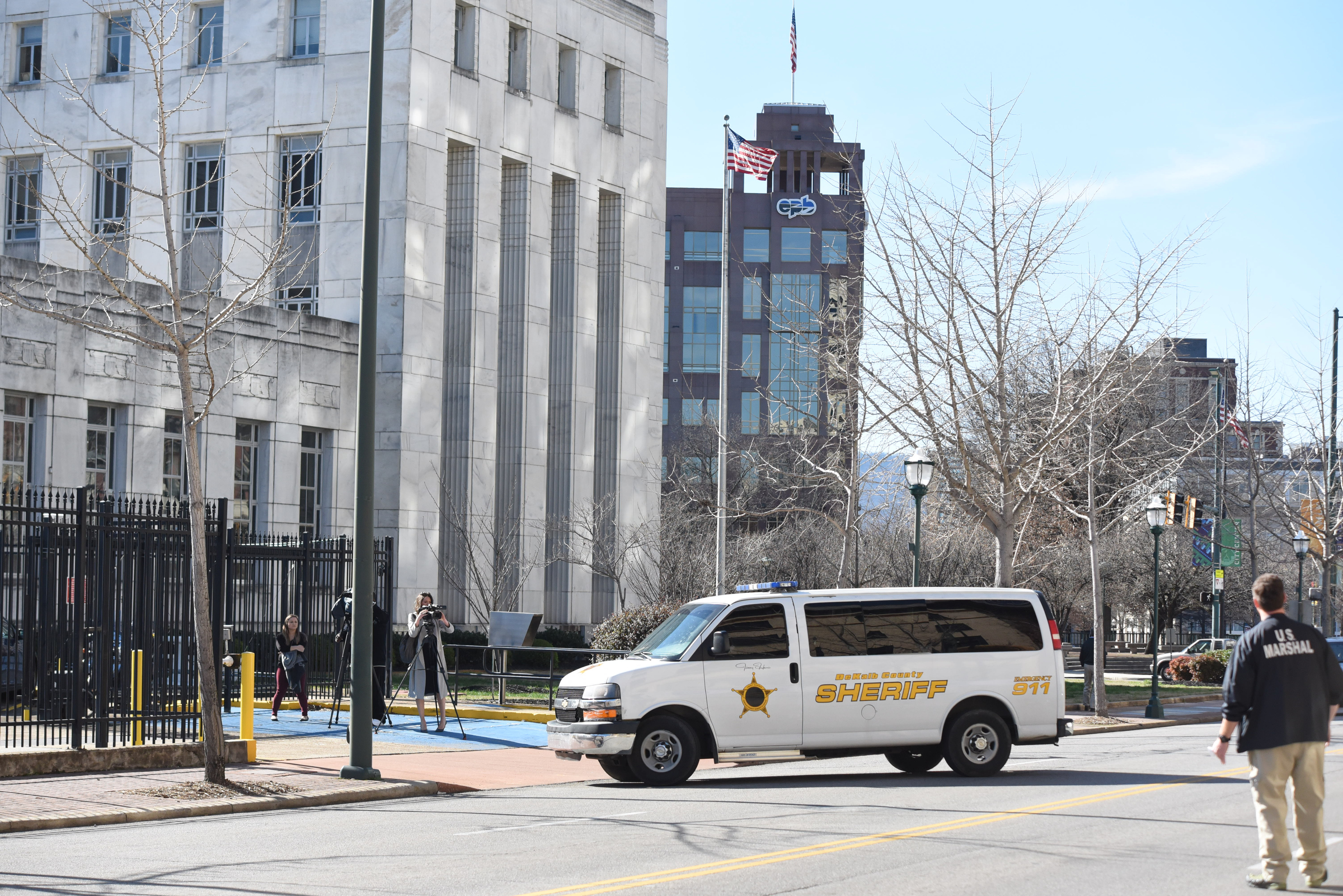
In the end, Robert Doggart's fate went the opposite way than he expected.
Jurors unanimously convicted the former Tennessee Valley Authority engineer of recruiting people to burn down a mosque in a Muslim community Thursday in U.S. District Court. The verdict came after 16 hours of deliberating over the course of three days. Afterward, a U.S. marshal ushered the 65-year-old across the courtroom and transported him to federal custody in Alabama.
Thursday's verdict wrapped up a high-profile case for government prosecutors, who argued Doggart needed to be convicted of one count of solicitation to commit a civil rights violation, one count of solicitation to commit arson of a building, and two counts of threat in interstate commerce. For proof, they played several phone calls in which Doggart discussed burning down a mosque at Islamberg and using assault rifles on any Muslims who opposed him or his self-assembled militia.
Jurors, who started deliberating Tuesday, didn't seem immediately convinced.
After asking for clarification about the charge involving interstate commerce in the morning, jurors said around 4:30 p.m. Wednesday they couldn't reach a unanimous decision. Defense attorneys called for a mistrial, but U.S. District Court Judge Curtis Collier instead told jurors to return Thursday at 9 a.m. They asked for the definitions of "incremental" and "determinative" before returning their decision around lunchtime.
"Our nation cannot tolerate threats by those who are willing to kill innocent children, women and men who do not share their religious beliefs or philosophy," Nancy Harr, U.S. attorney for the Eastern District of Tennessee, said in a statement afterward. Her assistant U.S. attorney, Perry Piper, worked the case along with Saeed Mody of the Civil Rights Divison in Washington, D.C. As a result of the conviction, Doggart faces up to 10 years maximum on each of the four charges for which he will be sentenced on May 31.
"I am heartened that citizens from Chattanooga, a community that was victimized by domestic terrorism just 18 months ago, chose to condemn the threat of more terroristic acts," Harr added. "The jury carefully and attentively listened to the proof, deliberated cautiously for two days, and reached a verdict that reaffirms our American principles."
Harr was referring to July 2015, when 24-year-old Mohammad Abdulazeez's assaults on a military recruitment center and the U.S. Naval and Marine Reserve Center killed five and ended with his own death. Her then-predecessor, Bill Killian, initially said Abdulazeez was being investigated for "domestic terrorism." He backed off a day later, instructing reporters not to get caught up in labels, since the Federal Bureau of Investigation was treating the incident as simply a "terrorism investigation."
During Doggart's proceedings, attorneys for Islamberg reiterated their desire to have a federal charge that could apply to alleged domestic terrorists, like Dylann Roof, the convicted white supremacist who killed nine African-American churchgoers in South Carolina.
Attorney Tahirah Clark, who is representing the town of Islamberg in a lawsuit against Doggart, praised the jury's courage, saying their verdict delivered a strong message to all Americans. "To sit there for a week and listen to this criminal, this terrorist, speak to others about killing our families, about burning down our village, that was very difficult I think the jury should be commended."
Throughout the trial, defense attorneys said Doggart exaggerated a number of facts on the phone, never had a consistent plan in place, got goaded into the attack by a confidential informant, and only wanted to conduct peaceful reconnaissance on Islamberg. Doggart, a former 2014 independent congressional candidate, was convinced Islamberg's residents wanted to carry out a terror attack on New York City or Delaware and believed he had a duty to investigate, attorney Jonathan Turner told jurors in closing arguments Monday afternoon. Law enforcement officers have said they found no evidence of plans for such an attack.
Another part of the defense team's argument focused on the concept of "true threat." In other words, did the government prove that Doggart said these words with purpose, and not in jest? As attorney Leslie Cory said Thursday after the verdict, "On counts three and four it is clear - none of the words spoken were spoken purposely."
"So, not a true threat?" Collier asked her.
"No," Cory replied, adding the defense planned to file another motion to acquit. Earlier in the week, they made a similar motion, but Collier denied it.
Collier said Thursday the evidence he heard during the trial made him think Doggart was dangerous because of his obsession with Islamberg. He denied the defense's request to keep Doggart - who has serious health issues, they said - on house arrest. Being out on bond might provide the Sequatchie County, Tenn., man his final opportunity to carry out the attack, Collier said.
Doggart's attorneys and family members declined to comment after the rendering of the verdict Thursday. But earlier in the week, Doggart told a group of reporters in the courtroom that his trial was a racially motivated attack on speech.
Killian, the former U.S. attorney for the Eastern District of Tennessee, tried to discuss the difference of free speech and "true threat" at an event in 2013 in Manchester, Tenn., after a Coffee County commissioner drew criticism earlier that year for posting an illustration of a man in a cowboy hat pointing a shotgun at the viewer with the caption: "How to wink at a Muslim."
"Let me be clear: In this country, hateful speech is allowed," Killian told a crowd of about 300, newspaper archives show. "It is protected by the freedom of speech part of the first amendment.
"But if someone makes threats of violence, that is not protected speech and they will be prosecuted," Killian continued. "Likewise, if someone commits acts of violence under the guise of religious or other speech, they will be prosecuted for their violent acts."
Contact staff writer Zack Peterson at zpeterson@timesfreepress.com or 423-757-6347. Follow him on Twitter @zackpeterson918.

